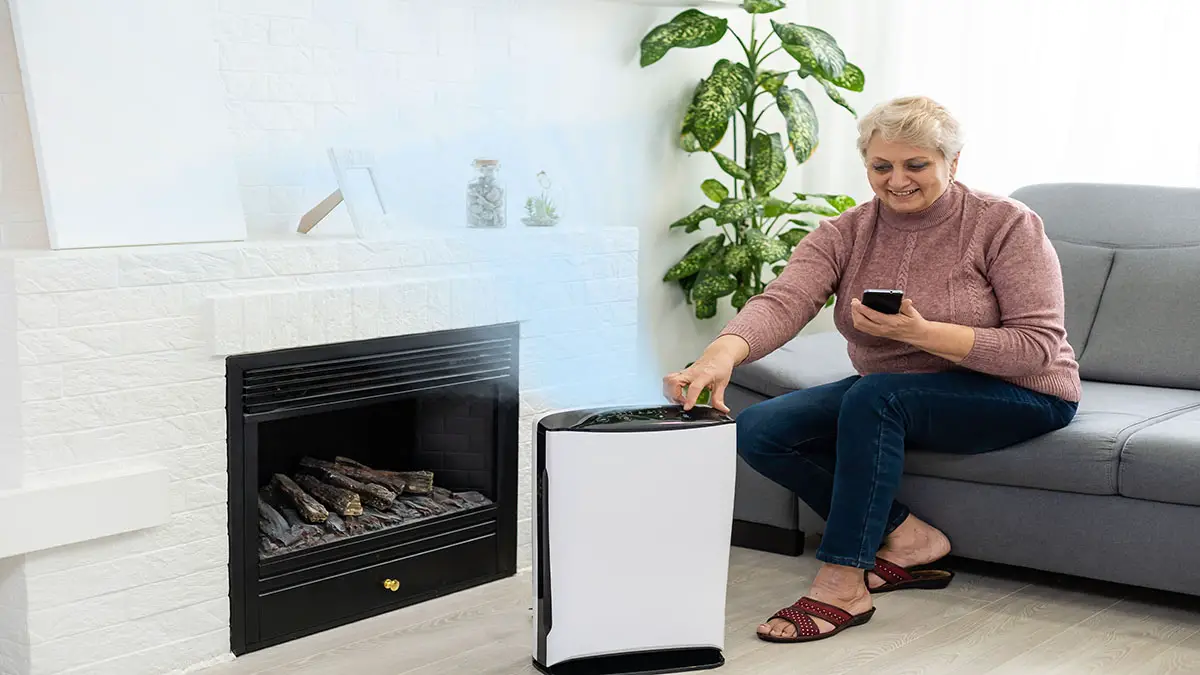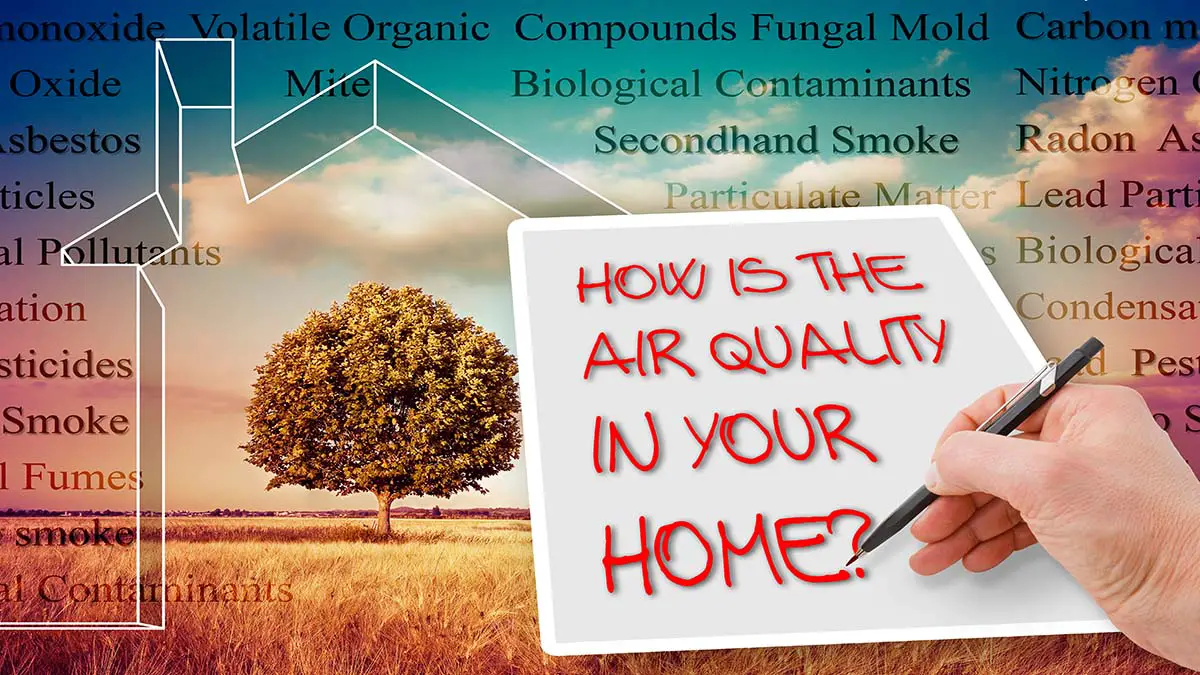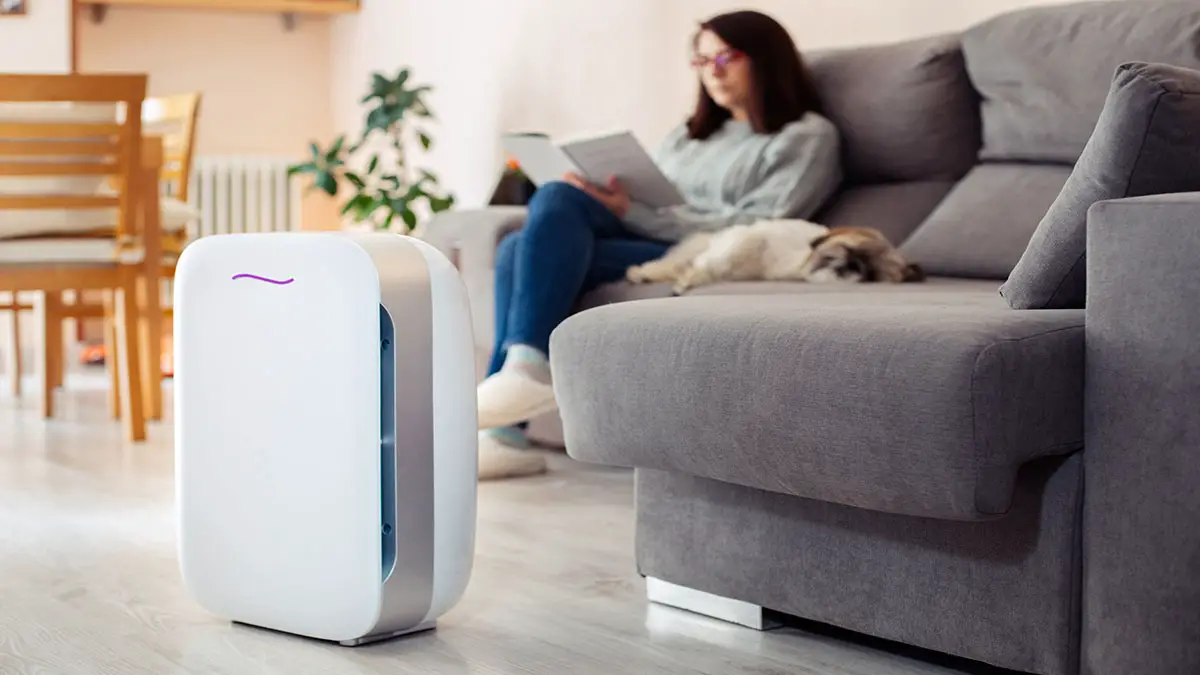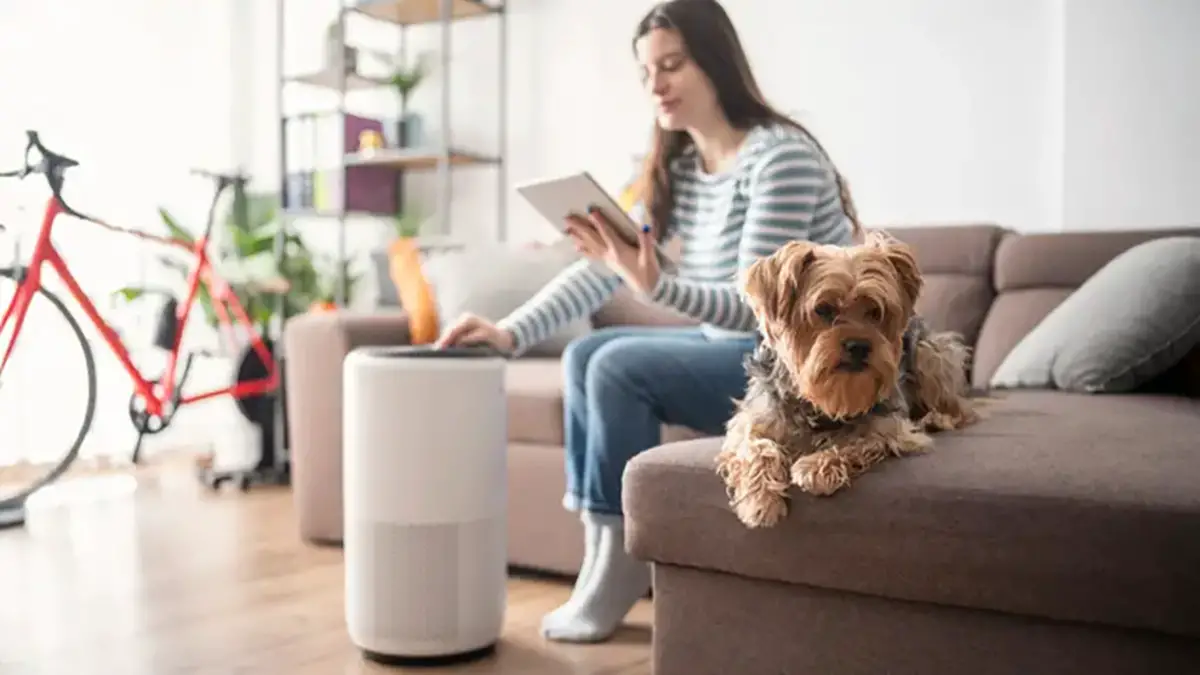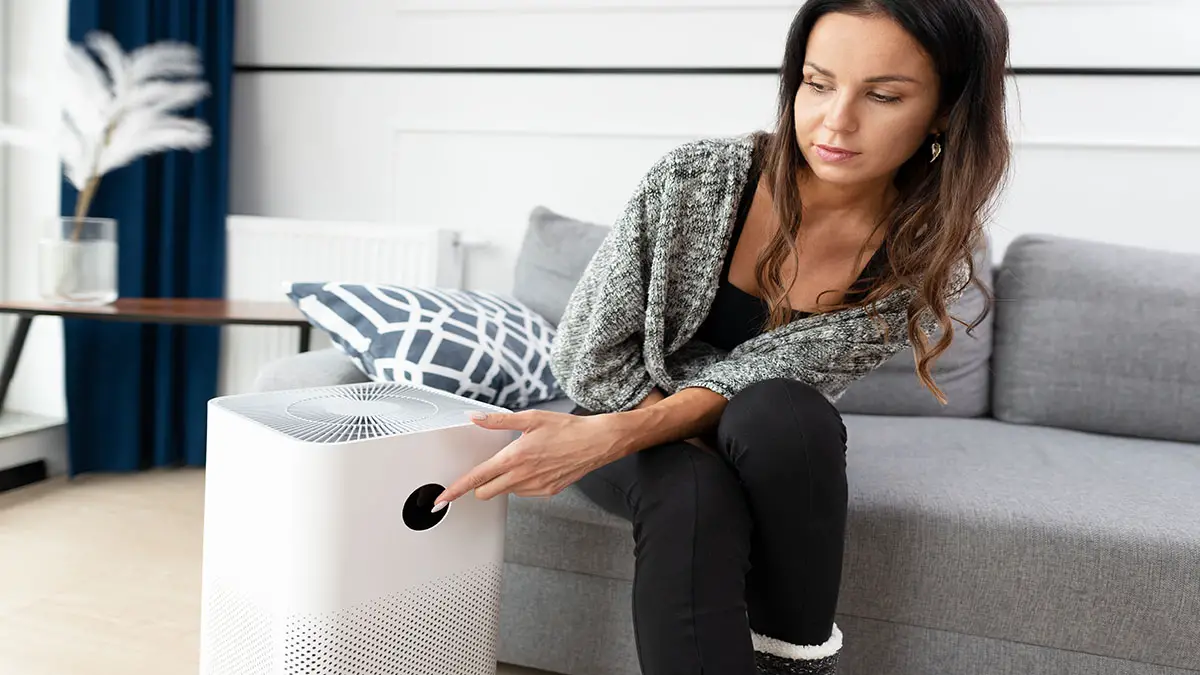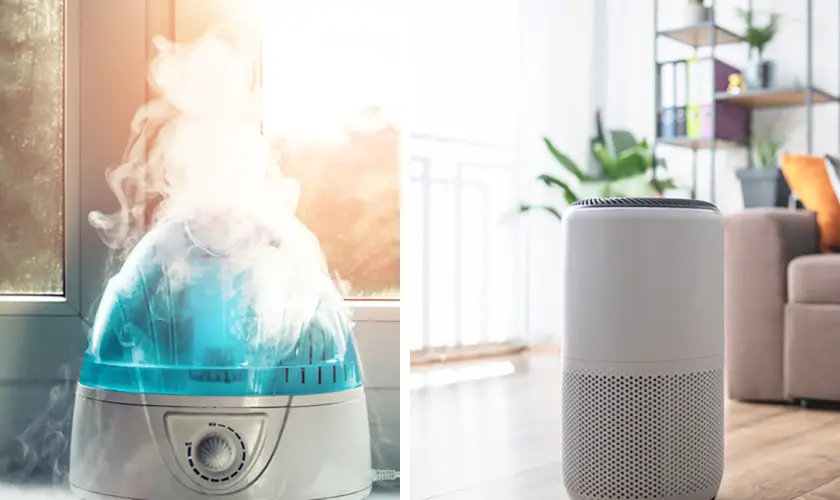
An air purifier removes pollutants, allergens, and contaminants to improve indoor air quality. Conversely, a humidifier adds moisture to the air to combat dryness and relieve symptoms like dry skin and irritated nasal passages.
| Air Purifier | Humidifier | |
|---|---|---|
| Cleans the Air | Yes | No |
| Adds Moisture to the Air | No | Yes |
| What it does | Remove pollutants, odors, and allergens like dust, pet dander, mold spores, bacteria, and smoke. | Adds moisture to the dry air when humidity is below 30%, maintaining 30% and 50% relative humidity. |
| Advantages | Reduces airborne pollutants that cause allergies and asthma attacks | It helps improve dry skin and respiratory conditions caused by dry air |
| When to Use | Year-round | Only during dry conditions or when the heat is on |
| Maintenance | Replace filters as needed routinely | Replace filters and clean routinely (Whole-house humidifiers require annual cleaning) |
- An air purifier doesn’t add any moisture to the environment. Instead, it removes or “inactivates” pollutants from the air. On the other hand, a humidifier adds moisture to the air.
- An air purifier uses a fan to circulate air through the device, whereas a humidifier uses heat or vibration to move water droplets into the atmosphere.
- An air purifier usually has a HEPA filter (or multi-filters) that traps dust, pollen, pet hair, smoke, mold spores, bacteria, viruses, and other contaminants. A humidifier typically comes without a filter and may include a wick or a heating element to keep the air moist.
- An air purifier cleans the air by trapping or removing pollutants, whereas a humidifier only adds moisture to the air, making it easier to breathe.
Air Purifiers and Humidifiers Advantages
Air purifiers and humidifiers are two very different types of products. While both can improve indoor air quality, key differences should be considered.
Air Purifiers
An air purifier removes airborne contaminants, whereas a humidifier adds moisture to the air. Both can improve indoor air quality and reduce allergic reactions, but each product addresses different issues.
According to the National Institutes of Health, air purifiers remove airborne particles, including allergens, bacteria, smoke, dust, pollen, mold spores, and pet dander. However, they do not eliminate viruses, which are extremely small and can easily pass through regular filters.
An air purifier removes airborne contaminants, such as dust particles, bacteria, mold spores, pet dander, smoke odors, and other harmful particles from the indoor air. Air purifiers work by sucking in your home’s air and running it through a series of filters.
The HEPA filter is an air filter that can eliminate particles as small as 0.3 microns from the air. Suppose you’re wondering what True HEPA filters are made of. In that case, they are usually a combination of tightly woven plastic and fiberglass threads that prevent larger particles from passing while still allowing airflow.
Types of Air Purifiers
There are many different kinds of air purifiers available today. Each type comes with its unique benefits and drawbacks. Here are seven key differences between air purifiers:
- HEPA Filters – These filters trap airborne contaminants, including allergens, fine dust, pollen, mold spores, animal dander, and even cigarette smoke. They are effective at filtering out microscopic particles down to 0.3 microns. However, they do not remove larger particles like pollen and dust.
- Carbon Filters – These filters contain activated carbon that removes gases, odors, VOCs, and chemical toxins from the air. They work great for keeping homes smelling fresh and reducing the risk of respiratory problems.
- Negative Ionizers – These devices emit negative ions into the air, which attract airborne contaminants and cause them to fall to the ground where the air filters can collect them. This process works exceptionally well for eliminating ultra-fine particles down to 0.01 microns.
- Ultraviolet Lights – These lights kill airborne bacteria and viruses by damaging their molecular DNA structure. They effectively kill microbes and viruses that may be present in the air.
- Air Cleaners – These machines combine multiple air-cleaning technologies into one device. Some models include HEPA filtration, ionizing, ultraviolet, humidification, and deodorization. They are often referred to as medical-grade air purifiers.
There are two types of air purifiers: portable and whole house. Portable ones are more affordable and can service single rooms better, while whole-house systems clean all the air as it passes through your HVAC system.
Humidifiers
Humidifiers moisten the air, typically at a relative humidity of 30% to 50%. Relative humidity refers to the percentage of water vapor in the air compared to the total air volume. As the air becomes drier, the relative humidity decreases.
A humidifier helps prevent dry air, which can cause irritation and aggravate respiratory problems. It also provides relief from the symptoms of colds and flu.
A humidifier’s primary purpose is to add moisture to your home’s air. It does this by pumping water vapor into a room, which may or may not be visible. This contrasts with a dehumidifier, which removes water vapor from the air.
A humidifier creates a fine mist from the water to add moisture to the air, benefiting people in dry areas. People use humidifiers to help with dry skin, throat irritation, sinus issues, nosebleeds, and breathing problems caused by an arid climate.
A humidifier’s purpose is to raise the room’s relative humidity. High humidity levels will trigger mold growth if your home already has high humidity. The ideal indoor humidity level should be between 30% and 50%.
If the humidity in your home is below 30%, it’s too dry. If it’s over 50%, you’re at risk for mold growth, dust mite reproduction, and mildew.
If you can’t get the levels down to a safe range, your best bet is to get an air purifier specializing in removing mold spores from indoor spaces.
Types of Humidifiers
There are several different kinds of humidifiers available today. You’ll find them in stores everywhere, including Amazon.com. Some of the most popular include:
- Warm mist – These humidifiers heat water using a gentle boiling process to create a warm mist you see and feel in the room.
- Cool mist – These humidifiers trap sediment, minerals, and impurities while delivering a cooler, invisible mist that evaporates from the room.
- Ultrasonic – This humidifier uses metal diaphragms that vibrate at an ultrasonic frequency to push water droplets into the air. This produces a cool, lighter mist that quickly dissipates into the room.
There are two types of humidifiers on the market: portable and whole-house models. Portable ones are more affordable and can service small areas, while whole-house systems humidify all the air through your HVAC system.
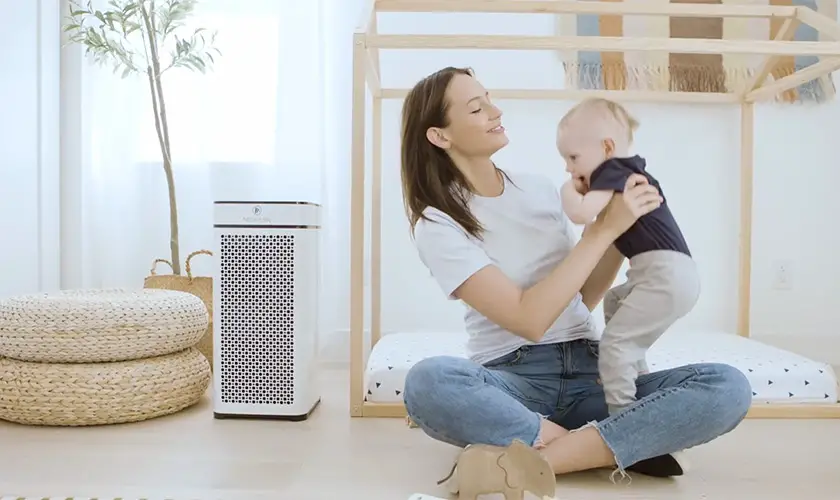
Air Purifier vs Humidifier: Which is Better for Your Health?
Both air purifiers and humidifiers can affect the air quality in your home. However, they work in very different ways. An air purifier pulls small particles out of the air and traps them in a series of filtration systems. A humidifier adds water vapor to the air. Both types of devices can help alleviate symptoms caused by indoor pollutants.
An air purifier removes small particles, including dust, pet dander, mold spores, pollen, and volatile organic compounds (VOCs). Some models can also filter out smoke and odors.
A humidifier adds moisture to the air, helping to keep rooms comfortable. You can find humidifiers in two forms: portable units and wall-mounted ones.
Humidity levels should range between 40% and 60%. Too little humidity can cause dryness and irritation, while too much can lead to headaches, sinus infections, and sore throats.
There are several benefits to using an air purifier or humidifier. Both machines can help reduce the effects of pollution and irritants in the air.
However, neither device is a cure for allergies or asthma. Rather, they simply provide relief from symptoms.
Air purifiers and humidifiers have different impacts on air pollution that can affect your health. Here are some common conditions:
Asthma and Allergy Symptoms
Air purifiers help alleviate allergy and asthma symptoms by reducing exposure to common triggers, like dust mites, pet dander, pollen, and mold spores. Allergens float in the air on particles that can stay suspended for hours. Most air purifiers can remove microscopic air pollutants as low as 3 microns.
Although humidifiers do not influence allergen levels, some people find that using a humidifier can make their symptoms less severe if they have dry and irritated nasal passages.
It is essential to remember that humidifiers will not eliminate allergy or asthma symptoms and could cause an individual to suffer from allergies and asthma. If a humidifier is not cleaned properly, it can grow mold, releasing mold spores into the air; these mold spores are known to trigger allergy and asthma symptoms. 1
Colds, Flu, and Respiratory Infections
Many air purifiers only remove large particles from the air, but some viruses create such tiny particles that regular filters can’t trap them. Even though an air purifier cannot stop a cold you have already contracted, it might make your symptoms more tolerable by removing other respiratory irritants from the atmosphere.
However, a humidifier doesn’t have any effect on virus levels. Rather, it helps alleviate symptoms by adding moisture to the air. A humidifier won’t cure you once you’re sick but it can make symptoms less miserable.
The NIH states that a humidifier might help alleviate a congested nose and the pain of colds or influenza. The proper amount of humidity may also afford some protection from viruses. According to several studies, raising the air’s humidity to 40-60 percent decreases how infectious viruses are.
Dry Air
An air purifier does nothing to add moisture to the air. Therefore, it won’t help with excessively dry air. Dry air can aggravate several respiratory illnesses, including asthma, bronchiectasis, chronic obstructive pulmonary disease (COPD), and sinusitis. A humidifier adds moisture to the air, increasing relative humidity and improving the comfort of dry air.
Note that neither device can cure you once you’re sick, but they can help alleviate symptoms.
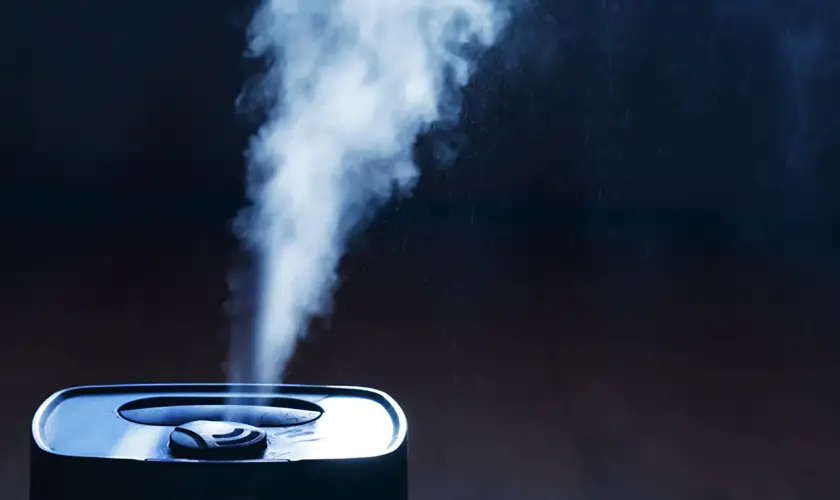
Air Purifier vs Humidity: Which Works Best
An air purifier is a great way to improve indoor air quality, especially if there is a lot of dust, mold, pollen, pet dander, cigarette smoke, etc., in the air. Air purifiers can remove many airborne contaminants, including particulate matter, volatile organic compounds, ozone, and gases like hydrogen sulfide.
Air purifiers are ineffective at mitigating dangerous radon gas levels in your home. For radon gas mitigation, see a local certified radon technician to have your home radon levels tested.
A humidifier helps relieve dry air problems, which can cause sore throats, runny noses, coughing, sneezing, headaches, fatigue, and other common winter ailments. Some humidifiers can also relieve sinus infections, earaches, and other illnesses caused by dry air.
Neither a humidifier nor an air purifier can cure asthma or other illnesses. You still need to treat the underlying causes of the condition.
A Baby’s Nursery
For babies, a humidifier can prevent a dry and scratchy nose and throat, so the FDA suggests that parents use a cool mist humidifier for infants suffering from cough and cold symptoms. The humidity will help shrink nasal passages so your baby can breathe more easily.
While a warm mist humidifier can have the inverse effect of causing nasal passages to swell, making it difficult to breathe, they’re effective in reducing the infectiousness of bacteria and viruses when used to maintain an ideal relative humidity between 40-60 percent.
An air purifier can eliminate atmospheric pollutants, including carcinogens from tobacco smoke, toxic fumes emitted by plastics, allergies, and asthma triggers like mold spores or pet hair and pollen. Therefore, an air purifier is more suitable for a baby’s room when used regularly throughout the year.
People with Allergies
An air purifier is an excellent way to reduce allergens in your home. A unit with a HEPA filter can help trap particles, but the Molekule technology destroys allergens instead of trapping them. Though humidifiers may feel soothing for a stuffy nose or other irritation, they can worsen allergies because higher humidity improves the survival rates of dust mites.
People with Asthma
If you have asthma, you should consider getting an air purifier instead of a humidifier. While a humidifier can help alleviate some asthma symptoms, it cannot cure the disease. Instead, an air purifier removes pollutants from the air that can worsen asthma attacks.
While a humidifier might lessen additional symptoms if you already have asthma and suffer from dry air, it does nothing to improve the condition.
High humidity levels can be dangerous for those with asthma because they provide an environment where harmful bacteria, dust mites, and mold flourish. Since pollutants cause most asthma attacks, air purifiers are a better option.
FAQs
Does an air purifier replace a humidifier?
No, an air purifier does not replace a humidifier. Since the two perform different functions, one can not replace the other. Air purifiers remove airborne contaminants but don’t add moisture to the air. Humidifiers add moisture but do not remove airborne contaminants from the air.
Is an air purifier or humidifier better for your sinuses?
An air purifier filters out allergens which can help reduce allergy symptoms. Humidifiers add moisture to the air and can help you cope with allergy symptoms but cannot remove the allergens that cause the symptoms. Air purifiers are better because they filter out allergens so you can breathe more easily and work year-round.
Do air purifiers dry out sinuses?
Dry sinus symptoms are caused by dry air (low humidity). Air purifiers do not dry out sinuses but can worsen dry sinus symptoms. Using an air purifier in dry air conditions or for too long can worsen dry sinus symptoms by over-drying nasal passages.
Should you use an air purifier and humidifier?
You can use both simultaneously because air purifiers and humidifiers perform different functions. Air purifiers purify the air year-round, while humidifiers only add moisture when needed.
Does an air purifier help with a stuffy room?
An air purifier helps circulate and filter the air in a room, which can help reduce stuffiness. Stuffiness is often caused by stagnant air, which an air purifier can help to alleviate.



